Another bipartisan bill has passed and signed into law—one more in a long line of legislation that strips power from the people and hands it to the very institutions that already control too much. It’s called the GENIUS Act, and it’s anything but genius.
On the surface, the Guiding and Establishing National Innovation for U.S. Stablecoins Act (GENIUS Act) is framed as financial regulation. Supporters say it creates clear rules for stablecoins—digital currencies pegged to the U.S. dollar. They claim it protects consumers, prevents fraud, and brings stability to crypto markets.
But that’s not what this bill is really about.

Neoliberals and Republicans in both the house and senate came together—yet again—to stick it to the people. And in fashion, several Democrats and all Republicans within the Great Lakes Basin Region voted for this diabolical bill. Democrats who voted for this will tell you it’s necessary. They’ll say it protects consumers and brings clarity to crypto. But nothing in this bill protects the average person. Nothing about it empowers working families, small businesses, or communities trying to build life within the system that strangles them.
This bill isn’t about safety. It’s about compliance. It’s about surveillance. And it’s about consolidating financial power in the hands of government-approved corporations while leaving the rest of us with fewer choices, fewer rights, and no say in how the future of money is built.
Once again, those in power are calling it progress. But what it really does is make it easier to lock the public out of participation—quietly, legally, and without recourse.
This bill won’t hit all at once. It won’t come crashing down in some dramatic public shift. It’ll roll out quietly—thread by thread, system by system—if we allow it.

What It Actually Does
Here’s how the GENIUS Act works in practice:
• Only approved corporations can issue money
Yes. Corporations. Stablecoins can now only be issued by banks or federally licensed institutions. That means small businesses, local financial networks, open-source projects, and decentralized communities are locked out by default.
This isn’t about innovation. It’s about control of issuance. The power to create money has been handed from the public realm to a private tier of government-aligned financial actors.
• All stablecoins must be backed by U.S. Treasuries
This links all digital money directly to government debt. It ensures that even your digital dollars serve the federal financial apparatus first—not local economies or the public good. It also centralizes risk. If Treasury markets face pressure, so does your money.
• Issuers must be able to freeze, block, or revoke your funds
This is in the bill’s core structure. The U.S. Treasury’s own guidance says that stablecoin issuers must be able to “freeze, burn, or prevent transfer” if directed by regulators (U.S. Treasury). There’s no requirement for due process, no standard for evidence, and no obligation to notify you.
• Stablecoins become programmable by design
According to MIT’s Digital Currency Initiative, programmable money systems “can enforce arbitrary logic on transactions,” meaning they can be coded to restrict when, where, or how you spend—down to the vendor, time of day, or category of item.
The Bank for International Settlements (BIS) has already outlined real-world use cases where funds can be set to expire, be location-limited, or denied based on policy compliance. That’s not sci-fi. That’s architecture
The Real Shift: From Public Currency to Private Infrastructure
This bill doesn’t crash the dollar. It replaces its function.
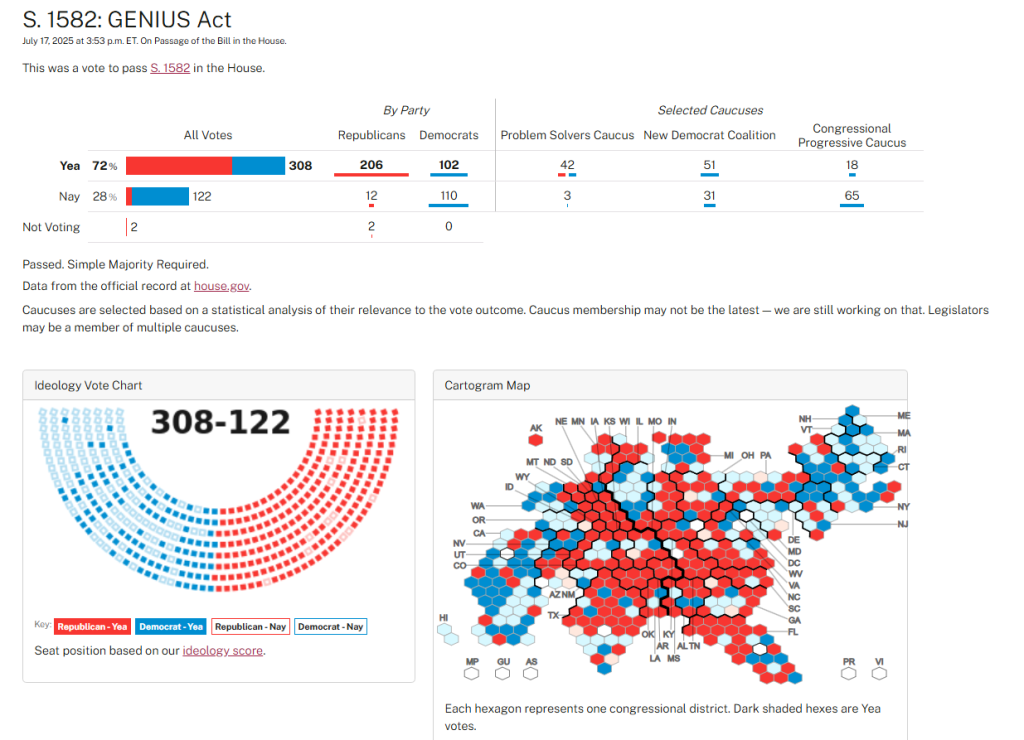
According to BIS—the central bank for central banks—programmable currencies can be designed to expire, become geofenced, or operate conditionally based on government policy. In their own words, this technology “raises fundamental questions about autonomy, consent, and the rule of law.”
Once stablecoins become normalized and cash continues to disappear, the “dollar” in your digital wallet won’t come from the U.S. Treasury. It’ll be issued by a corporation. It’ll be backed by government bonds. It’ll be programmable. And it can be revoked.
The dollar won’t disappear in name. But everything that makes it public—its neutrality, accessibility, and independence from corporate approval—will be gone.
Your money becomes a service you’re allowed to use. Until you’re not.
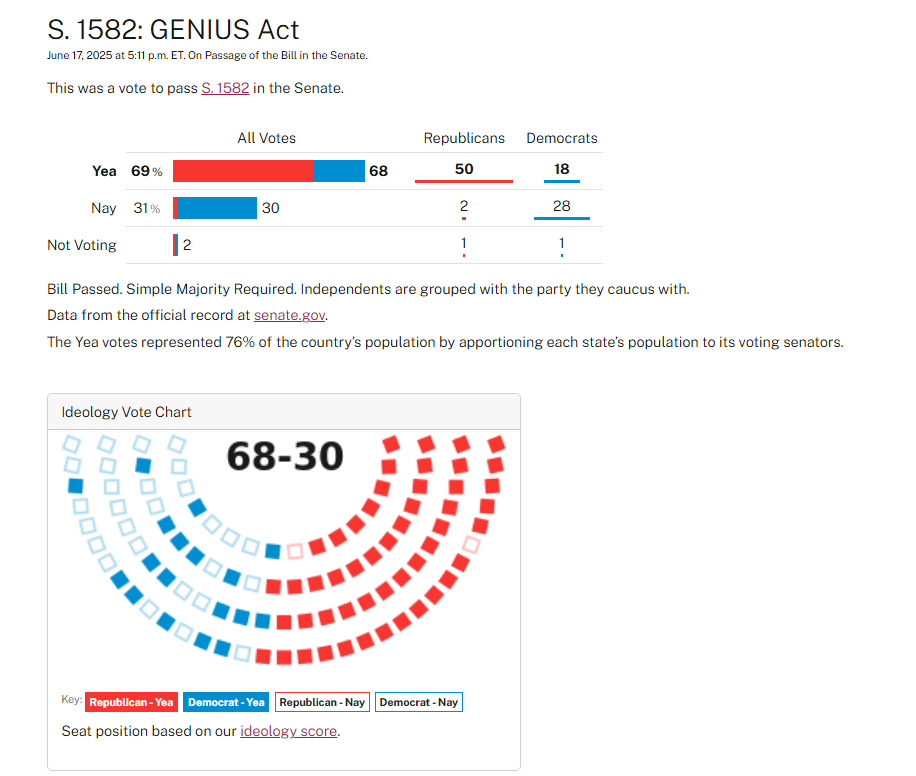
Exile by Design
This law builds a system that makes it possible to erase people from society without arresting them.
You know that dystopian Project 2025 and The Big Beautiful (Ugly) Bill? This bill is yet another step toward a full corporate takeover of our almost democracy.
You won’t need to be charged with a crime. You won’t need a court date. If your account gets flagged, your ability to pay rent, buy groceries, or accept donations can be shut off instantly. And with no physical cash left, you’ll have nowhere else to go.
This isn’t hypothetical. It’s already happening in other countries. Are we really going to let it happen here?
- In 2022, Canadian protestors had their bank accounts frozen.
- GoFundMe and PayPal have frozen funds for legal protest groups.
- In China, your financial access is directly tied to government-defined behavior.
The GENIUS Act doesn’t resist these trends. It lays the groundwork to scale them—quietly and legally.
Who Voted for This?
This wasn’t a fringe vote. It passed with overwhelming bipartisan support.
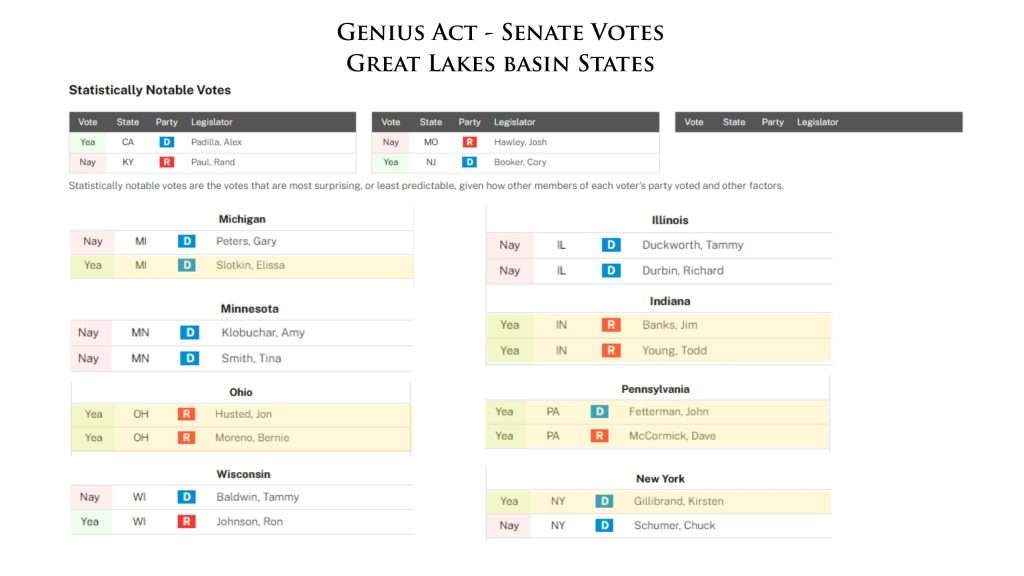
- In the House, 102 Democrats joined Republicans to pass it.
- In the Senate, 18 Democrats helped push it through.
- Representatives from across the Great Lakes Basin Region—whose districts include working-class towns, farming communities, and legacy union families—voted yes.
They voted—yet again—to strip more of your autonomy away.
But they’re not coming after you, right? You’re the wrong color, the wrong sex, the wrong gender—the wrong class?
These aren’t just red state power plays. These are elected officials from so-called blue strongholds handing over financial control to private entities backed by federal muscle.
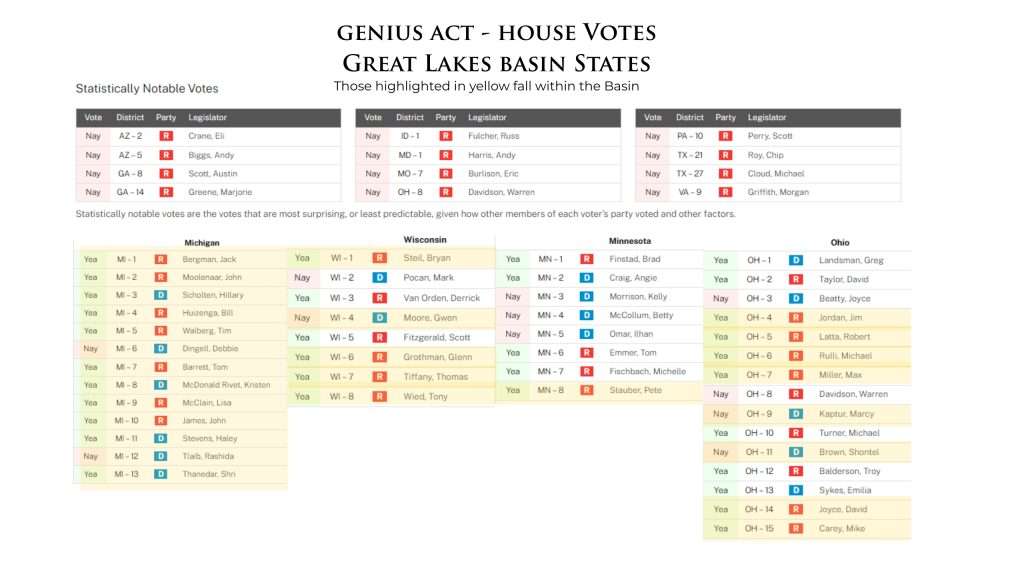
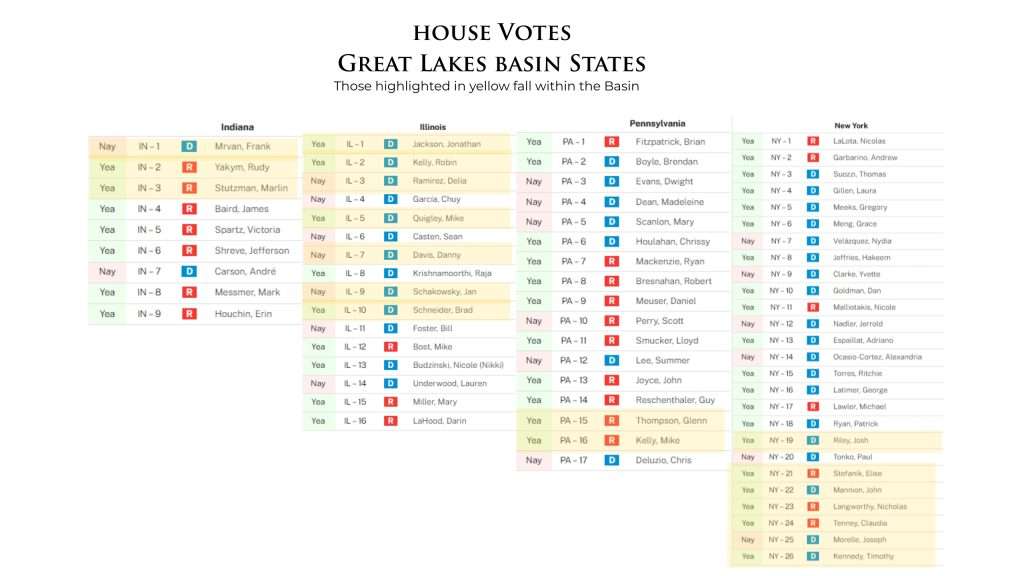
Let’s Be Clear
If this was about consumer protection:
- There would be built-in privacy safeguards.
- There would be a public option for stablecoin issuance.
- There would be legal standards for freezing or revoking funds.
- There would be protections for cash and offline access.
None of that exists in the GENIUS Act. Because this bill wasn’t written for the people. It was written for those who profit off managing the people.
So What Can We Do?
This law is designed to prevent decentralized and community-based systems from rising. It doesn’t just regulate. It excludes.
And that means the fight ahead won’t be about finding legal workarounds. It will be about resistance.
We don’t stop this by waiting for Congress to fix what they’ve already sold. We stop this by resisting the rollout of control while we still have it.

• Keep using cash
Cash is independence. Every time you use it, you slow down the transition. Support businesses that accept it. Push for its protection at the local level.
• Build parallel systems
Mutual aid, co-ops, credit unions, barter economies—anything that decentralizes financial power is resistance.
• Don’t normalize compliance
The more we treat digital identity, wallet approval, or transaction tracking as “just the way it is,” the more this system wins. Question everything. Talk about it with everyone.
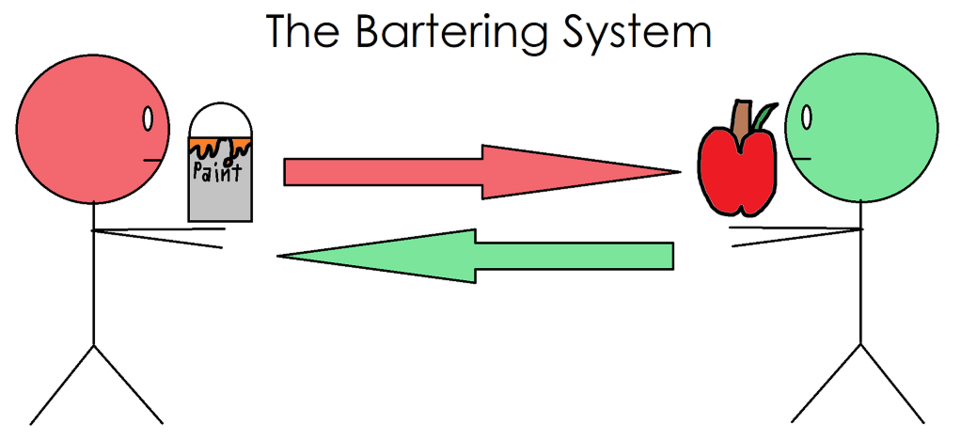
Demand protection of the right to exist—before it’s too late.
Push back at the state and local level. Demand protections for cash. Fight for bans on financial surveillance without a warrant. Support local ordinances that guarantee public access to basic financial systems—even without digital IDs or wallets. If they won’t protect us at the top, we build pressure from below. This isn’t reform. It’s defense. Defense of our right to live, to transact, to exist without approval.
And hold every politician who voted for this bill accountable. It’s well past time both parties are held to the fire for selling us down the river. Neoliberal Democrats—who consistently vote against the interests of the people while lining their pockets with corporate money—don’t get a free pass just because they’re not Republicans. Stop the “blue no matter who” mantra.
Let’s be honest—resistance alone won’t be enough if we don’t understand how the shift happens.

It’ll start with your banking app. A simple update. A new “digital wallet” option. Then maybe a government rebate or tax return, but only if you opt in. And many will for the convenience. Maybe your health benefits get issued faster that way. Maybe it’s required for “identity verification.” Maybe it just becomes the default.
Then the local businesses follow. One by one, they stop taking cash. This is already happening. Not because the law says so but because the system makes it inconvenient to take cash. It becomes too expensive to process. Too hard to insure. Too slow. Digital is cleaner, quicker, easier to track. That’s what they’ll say.
Next come the platforms. Services you rely on start accepting stablecoins only. Not out of conspiracy but out of compliance. To keep their licenses. To avoid fines. To stay inside the boundaries set by unelected regulators and their private-sector partners.
And before you even realize it’s happened, your financial autonomy isn’t just compromised. It’s gone. You’re inside a system where participation is permissioned, and that permission can be revoked—at any time, for any reason, without explanation.
That’s how it works.
Not with a bang. Not with panic or collapse. But with the quiet grind of compliance. With one thousand invisible steps that slowly erase your ability to choose. You already see it happening. You’re already experiencing it one hundred different ways.
But we still have the ability to say no. We can start refusing now and remove our participation from their system. Removing polticians who do not support the will of the people and only that of corporate conglomerates. We can build something better. Together. A true democracy. One without corporate control. One without political manipulation. It’s just a matter of will.
Because no one is coming to save us. You shoud have realized that by now. This is yet another bill that proves it. And no one is going to protect our freedom if we won’t protect it ourselves.











